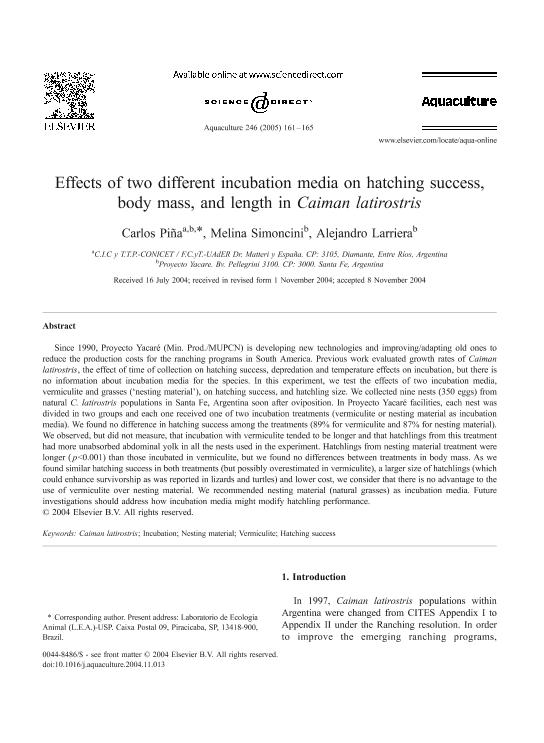Mostrar el registro sencillo del ítem
dc.contributor.author
Piña, Carlos Ignacio

dc.contributor.author
Simoncini, Melina Soledad

dc.contributor.author
Larriera, Alejandro

dc.date.available
2019-08-01T20:26:22Z
dc.date.issued
2005-05
dc.identifier.citation
Piña, Carlos Ignacio; Simoncini, Melina Soledad; Larriera, Alejandro; Effects of two different incubation media on hatching success, body mass, and length in Caiman latirostris; Elsevier Science; Aquaculture; 246; 1-4; 5-2005; 161-165
dc.identifier.issn
0044-8486
dc.identifier.uri
http://hdl.handle.net/11336/80760
dc.description.abstract
Since 1990, Proyecto Yacaré (Min. Prod./MUPCN) is developing new technologies and improving/adapting old ones to reduce the production costs for the ranching programs in South America. Previous work evaluated growth rates of Caiman latirostris, the effect of time of collection on hatching success, depredation and temperature effects on incubation, but there is no information about incubation media for the species. In this experiment, we test the effects of two incubation media, vermiculite and grasses ('nesting material'), on hatching success, and hatchling size. We collected nine nests (350 eggs) from natural C. latirostris populations in Santa Fe, Argentina soon after oviposition. In Proyecto Yacaré facilities, each nest was divided in two groups and each one received one of two incubation treatments (vermiculite or nesting material as incubation media). We found no difference in hatching success among the treatments (89% for vermiculite and 87% for nesting material). We observed, but did not measure, that incubation with vermiculite tended to be longer and that hatchlings from this treatment had more unabsorbed abdominal yolk in all the nests used in the experiment. Hatchlings from nesting material treatment were longer (p<0.001) than those incubated in vermiculite, but we found no differences between treatments in body mass. As we found similar hatching success in both treatments (but possibly overestimated in vermiculite), a larger size of hatchlings (which could enhance survivorship as was reported in lizards and turtles) and lower cost, we consider that there is no advantage to the use of vermiculite over nesting material. We recommended nesting material (natural grasses) as incubation media. Future investigations should address how incubation media might modify hatchling performance.
dc.format
application/pdf
dc.language.iso
eng
dc.publisher
Elsevier Science

dc.rights
info:eu-repo/semantics/openAccess
dc.rights.uri
https://creativecommons.org/licenses/by-nc-sa/2.5/ar/
dc.subject
Caiman Latirostris
dc.subject
Hatching Success
dc.subject
Incubation
dc.subject
Nesting Material
dc.subject
Vermiculite
dc.subject.classification
Ecología

dc.subject.classification
Ciencias Biológicas

dc.subject.classification
CIENCIAS NATURALES Y EXACTAS

dc.title
Effects of two different incubation media on hatching success, body mass, and length in Caiman latirostris
dc.type
info:eu-repo/semantics/article
dc.type
info:ar-repo/semantics/artículo
dc.type
info:eu-repo/semantics/publishedVersion
dc.date.updated
2019-07-31T13:33:49Z
dc.journal.volume
246
dc.journal.number
1-4
dc.journal.pagination
161-165
dc.journal.pais
Países Bajos

dc.journal.ciudad
Amsterdam
dc.description.fil
Fil: Piña, Carlos Ignacio. Provincia de Entre Ríos. Centro de Investigaciones Científicas y Transferencia de Tecnología a la Producción. Universidad Autónoma de Entre Ríos. Centro de Investigaciones Científicas y Transferencia de Tecnología a la Producción. Consejo Nacional de Investigaciones Científicas y Técnicas. Centro Científico Tecnológico Conicet - Santa Fe. Centro de Investigaciones Científicas y Transferencia de Tecnología a la Producción; Argentina. Proyecto Yacare; Argentina
dc.description.fil
Fil: Simoncini, Melina Soledad. Consejo Nacional de Investigaciones Científicas y Técnicas; Argentina. Proyecto Yacare; Argentina
dc.description.fil
Fil: Larriera, Alejandro. Proyecto Yacare; Argentina
dc.journal.title
Aquaculture

dc.relation.alternativeid
info:eu-repo/semantics/altIdentifier/url/https://www.sciencedirect.com/science/article/pii/S0044848604006556
dc.relation.alternativeid
info:eu-repo/semantics/altIdentifier/doi/https://doi.org/10.1016/j.aquaculture.2004.11.013
Archivos asociados
